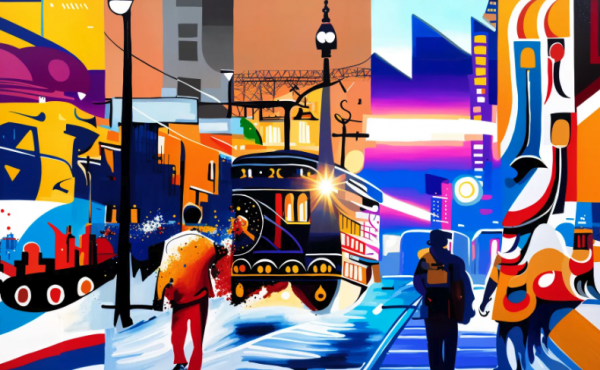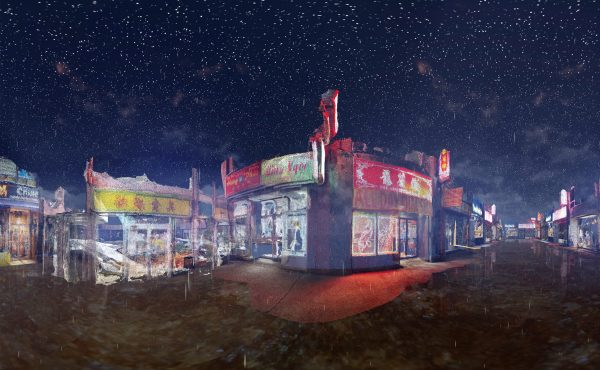
Life in a big city means from time to time it belongs to everybody else. In some major cities and world capitals, like London or New York, this is a near constant condition (a motorcade an hour, it would seem). Here in Toronto the city only really feels like that during certain times like Pride, Caribana or one-off events like World Youth Day in 2002. (Remember those subway cars full of young Catholics with red backpacks singing happily together?)
The Toronto International Film Festival, starting today, tended to be more of an acute phenomenon in the past, generally located in and around Yorkville — but over the last few years, with the closure of Queen Street for the CityTV party, and new hubs of activity around the city like at the Drake, it’s much more of a city-wide event. It’s easy to get that sort of intangible sense that “something is going on” walking around many parts of Toronto. I’m always amazed at how many people not at all involved in the film industry are excited about TIFF — the vast majority remaining on the less-couture side of the velvet ropes during all the parties and events that go along with the films themselves — indicating it really does take over a chunk of the city’s consciousness.
A couple weeks ago Robert Sharp, on his fine political and social commentary blog based out of Edinburgh, posted about the sad-but-kind-of-relieved feeling of a city returning to its citizens as the month-long Edinburgh Festival winded down:
Spare a thought for those of us still here. Although there is a week left to run on the International Festival, the chaos on the streets ends tonight as the Fringe finishes for another year. For us residents, it is nice to have the city ‘back’ (along with the keys to the flat we have so prudently rented out), but it also seems empty and lonely. During August, media focus is weighted heavily in our favour. As the cultural influence boomerangs back to London, I think we feel the loss.
No more late openings either. During the festival, it is as if the clocks in Edinburgh are put back a few hours, Edinburgh Daylight Squandering Time (EDST). In this local time-zone, 5am is the new 3am. Everywhere stays open later. This means parties and revelry finish later, which means bedtime is later, which means hang-overs are solved later… which means work starts later, which means work finishes later, which means parties and revelry start later, which means parties and revelry finish later. But the clocks go forward again tonight.
It would be interesting to hear about what people think about Toronto being given over to TIFF (keeping in mind Edinburgh’s much smaller population of 450,000 people means the impact it has on that city is much greater). I could do without the Cadillac Escalades letting people off at the gala events (a challenge to enlightened activist-actor’s like Sean Penn: ride a bike to the parties — big heavy Schwinns for the bodyguards too), but otherwise living in a city hosting what Roger Ebert calls the second most important film festival in the world after Cannes, is not so bad.
Photo of a lineup at the Cumberland by late_blOOmer*



10 comments
I fail to see why we should tolerate CityTV closing Queen St at its discretion. This is a major transportation route. Turning TTC vehicles to avoid the blockade is an impediment and really messes with the schedule. Does CityTV compensate the city by paying for the extra operators it requires to maintain schedule? Does CityTV compensate employees who lose time commuting due to this? Does CityTV compensate employers for lost employee time due to employees being late?
I see this as little more than public theft with the City of Torontos sanction.
I have no qualms with the festival itself. I have issues with individual entities engaging in self aggrandisement and stealing resources from the rest of us in the name of the festival. This should not be tolerated.
Geoffrey,
Soon enough CityTV will be gone from Queen West as Rogers takes it over. Though Much Music will continue to use Queen West as its party zone, meaning the continued blockage of the south sidewalk and curb lane.
Now that said, I don’t mind the occasional road closing (ie Taste of the Danforth, Corso Italia, Pedestrian Sundays, even Woofstock). But for a private event, it’s different.
The film fest coverage is a “CTV” event this year forward. Citytv is just a thorn in CTV’s side for the time being, and will probably be a low-key operation in its Rogers-owned future. (No street parties, etc.)
i never made the connection until this post — is TIFF the reason why the subways (sp bloor-yonge) have been packed crazy these past couple of days? i thought it was just back-to-school rush. then again maybe it is, if the film people are less likely to take public transit anyway…. ???
Most TIFF-enthusiasts take transit as they’re rushing from show to show. Driving from theatre to theatre is a crazy hassle with way too much money on parking. Only $9 gets you all-day transit, and most are on the subway route or within walking distance. You can see them by the tags dangling from their necks, etc…
Now, if we could only turn something like Yonge into a pedestrian zone during the festival to give it a better feel. Or if Toronto had some theatres near the waterfront so there could be lots of waterfront strolling….
I quite agree with Geoffrey about how the Queen St. is privatized and occupied for nothing really, and these occupations mess up the streetcar services.There’s also the loss of John St too. There’s a big parking lot on-site – why not use it instead of public space?
And has everybody heard a term “weapons of mass distraction?” which I think originally came from the Mash program, but it’s still quite applicable.
It is because of such narrow-minded,parochial and selfish ‘what about me?’ attitudes as posted by geoffrey that make anything in this city so difficult. and why the TIFF group should be applauded for managing to overcome such pettiness (abounding in this city) and still manage to put on a world-class event. CityTV parties and other events around the city are a big part of this success.
seriously, this is what living in a big city is about. sharing it with everybody even though you’re not always invited to the party…the queen streetcar is always a mess – CityTV party or not. take the king…
m.
Didn’t Ebert call it the most important festival, not second-most?
I took it from this Star interview where he was asked by Peter Howell:
So, number one for studios, number two in terms of….everything else altogether?
It should be noted that Cannes is actually four separate festivals (the Festival de Cannes, the Critics’ Week, the Directors’ Fortnight, and the Market) that take place simultaneously. And the reason it’s so much bigger than TIFF (and every other festival) is simply the Market, where producers and distributors from all over the world set up booths to buy and sell product. It’s pretty much a trade show or a convention, as near as I can tell. Additionally, all four of the Cannes festivals are restricted to press and industry (and government and sponsors, etc.). Regular folks (even monied ones, unless they have connections) can’t get into screenings.
Therefore, Toronto is the largest public film festival in the world.